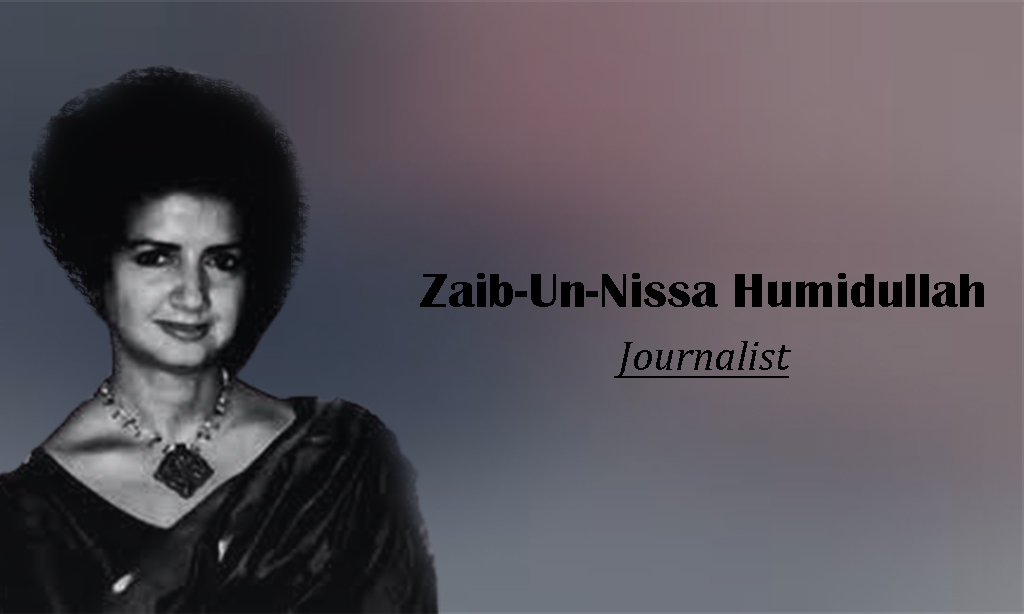Zaib-Un-Nissa Hamidullah, journalist was a Pakistani writer. She was a developer of Pakistani literature and journalism in English, and she was also a developer of women’s rights in Pakistani. She was Pakistan’s first female editor and publisher and the country’s first female columnist writing in English. Zaib-Un-Nisa Hamidullah, journalist Street in Karachi was named after her .Before independence in 1947, she wrote for many Indian newspapers and was the first woman to write a column in an Indian newspaper. After independence, her column newspaper Dawn made her the first female political commentator in Pakistan. After she left Dawn, she became the organizer and editor-publisher of the Mirror, the first social glossy magazine in Pakistan.
Early Life:
Zaib-Un-Nissa Hamidullah, Journalist, she was born in 1921 to a literary family in Calcutta. Her father, S. Wajid Ali, was the first person to translate the writings of the well-known Urdu poet Muhmmad Iqbal into Bengali and was an avid Bengali and Indian nationalist and writer. She had two brothers and one half-brother from her mother’s second marriage. Zaib-Un-Nissa started to write at an early age and received considerable support from both her English mother and Bengali father. A lonely child, Zaib-un-Nissa, took to writing poetry as a means to express her thoughts and emotions.
She was educated at the Loreto House Convent. She published her first poem in the lllustrated weekly of India in 1933. At age 15, she won a poetry struggle sponsored by England’s Daily Mirror for a poem she had published in the Star of India—a publication that later became part of the Dawn, a group of papers for which she eventually wrote.
Marriage:
In 1940, Zaib-Un-Nissa Hamidullah, Journalist, she married Khalifa Muhmmad Hamidullah. Unlike most marriages of the time, hers was not an arranged marriage. She moved with him to the Punjab area after their marriage. He worked there as an administrative for the Bata Shoes Company. During independence in 1947, she and her husband helped migrants coming across the Indian border.
Her husband belonged to a well-known Punjabi family. His father, Khalifa Muhammad Asadullah, was the librarian of the imposing library in Calcutta. Hamidullah, who was the head of Beta’s operations in Pakistan, was sent to head beta in Ireland in 1972.
After moving to Punjab in 1942, Zaib-Un-Nissa was shocked. Raised in an Anglo-Indian household, she found it hard to adjust, as she admitted in the introduction to The Young Wife.
Career:
Zaib-Un-Nisa first came into prominence in 1936, when a poem of hers was accepted for publication by Bombay’s Illustrated Weekly of India. From then on, she was a regular sponsor to that newspaper until independence in 1947. In 1943, her first book of poetry, Indain Buquet, was published by her father’s publishing house and proved to be very popular. All copies of the first edition were sold in three months. She followed up on her early success with Lotus Leaves, another book of poetry.
In 1945, Ziab-Un-Nissa and her husband were in Simla at the time of the conference. It was here that she met Fatima Jinnah. They became friends, and Jinnah soon managed to get an select interview with her brother, Muhmmad Ali Jinnah. This was a revolutionary in the young Zaib-Un-Nissa’s career, and it brought her India-wide fame. Her stories, poems, and articles also began to bring her more fame around this time.
After independence in 1947, Ziab-un-Nissa decided to work in field journalism and soon established herself as an outspoken writer in her column “Thru Women’s Eyes”, in the Karachi daily newspaper Dawn. This column began in December 1947. After some time, she rebelled against the limited scope of the feature, declaring that women should have the right to comment on every subject, including politics. Altaf Husain, then editor of Dawn, eventually agreed to give her a broader scope.
He recognized the merit of her work by giving her a new assignment: that of a columnist appearing on the editorial page. Ziab-un-Nissa became the first female political analyst in Pakistan. Her column established her character as an honest columnist who was not fearful to voice her opinions. It was also a huge step for the women’s rights movement in Pakistan.
Ban on the Mirror:
In 1957, her outspoken condemnation of the harsh regime of Major-General Iskandar Mirza and the forced resignation of Huseyn Shaheed Suhrawardy culminated in a six-month government ban on the mirror, issued on November 9. This ban, she was privately informed, would be withdrawn if she publicly apologized. She refused to do this and, on the advice of the well-known lawyer A.K. Brohi, appealed to the Supreme Court of Pakistan.
After Brohi’s intercession on her behalf, the Supreme Court passed judgment in her favor. Holding the order of the central government illegal and illegal, the government awarded her the budgets of the petition to Zaib-un-Nissa. This incident made journalistic history and gave her the distinction of being the first woman journalist to win a case in the Supreme Court.
Bibliography:
Indian Bouquet
Louts Leaves
Sixty Days in America
The Young Wife
The Flute of Memory
Poems, 1972, Mirror Publications, Karachi.
Death:
Zaib-Un-Nissa died on September 20, 2000, at the age of 81. She had been quick to the hospital on the 9th, but died in the early hours of the 10th due to water in her lungs.
An obituary in dawn newspaper said even her detractor admired her for the courage of conviction and the strength of character she displayed throughout her life. Another newspaper obituary said she will be long remembered for her revolutionary role in a certain category of journalism in Pakistan and as a powerful and courageous writer.
In the 1960s, the government named a major street in the Karachi city center after her, Zaib-Un-Nissa Street.


